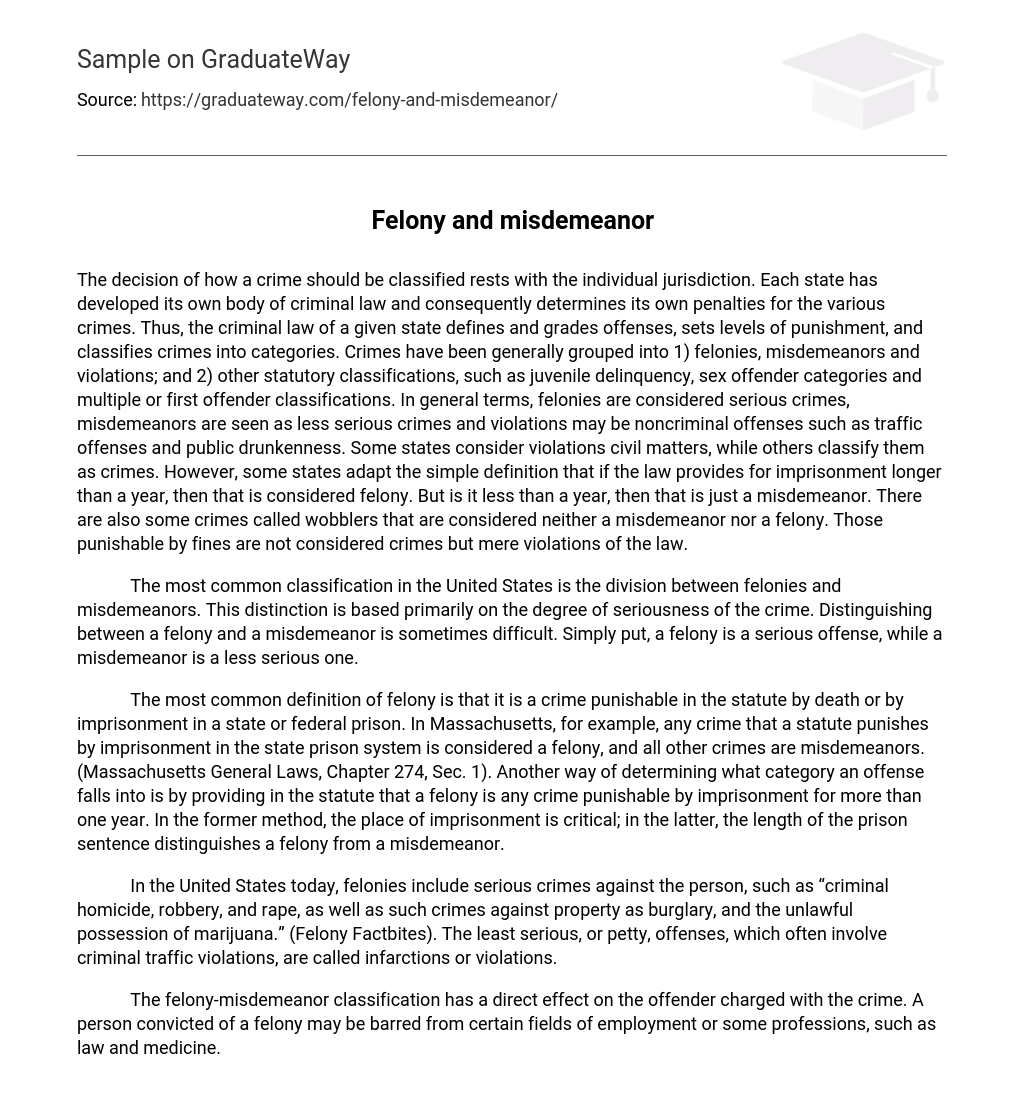The decision of how a crime should be classified rests with the individual jurisdiction. Each state has developed its own body of criminal law and consequently determines its own penalties for the various crimes. Thus, the criminal law of a given state defines and grades offenses, sets levels of punishment, and classifies crimes into categories. Crimes have been generally grouped into 1) felonies, misdemeanors and violations; and 2) other statutory classifications, such as juvenile delinquency, sex offender categories and multiple or first offender classifications. In general terms, felonies are considered serious crimes, misdemeanors are seen as less serious crimes and violations may be noncriminal offenses such as traffic offenses and public drunkenness. Some states consider violations civil matters, while others classify them as crimes. However, some states adapt the simple definition that if the law provides for imprisonment longer than a year, then that is considered felony. But is it less than a year, then that is just a misdemeanor. There are also some crimes called wobblers that are considered neither a misdemeanor nor a felony. Those punishable by fines are not considered crimes but mere violations of the law.
The most common classification in the United States is the division between felonies and misdemeanors. This distinction is based primarily on the degree of seriousness of the crime. Distinguishing between a felony and a misdemeanor is sometimes difficult. Simply put, a felony is a serious offense, while a misdemeanor is a less serious one.
The most common definition of felony is that it is a crime punishable in the statute by death or by imprisonment in a state or federal prison. In Massachusetts, for example, any crime that a statute punishes by imprisonment in the state prison system is considered a felony, and all other crimes are misdemeanors. (Massachusetts General Laws, Chapter 274, Sec. 1). Another way of determining what category an offense falls into is by providing in the statute that a felony is any crime punishable by imprisonment for more than one year. In the former method, the place of imprisonment is critical; in the latter, the length of the prison sentence distinguishes a felony from a misdemeanor.
In the United States today, felonies include serious crimes against the person, such as “criminal homicide, robbery, and rape, as well as such crimes against property as burglary, and the unlawful possession of marijuana.” (Felony Factbites). The least serious, or petty, offenses, which often involve criminal traffic violations, are called infarctions or violations.
The felony-misdemeanor classification has a direct effect on the offender charged with the crime. A person convicted of a felony may be barred from certain fields of employment or some professions, such as law and medicine. A felony offender’s status as an alien in the United States, might also be affected, or the offender might be denied the right to hold public office, vote or serve on a jury (Krantz, 1986,p. 702). These and other civil liabilities exist only when a person is convicted of a felony offense, not a misdemeanor.
Whether the offender is charged with a felony or a misdemeanor also makes a difference at the time of arrest. Normally, the law of arrest requires that if the crime is a misdemeanor and has not been committed in the presence of a police officer, the officer cannot make an arrest. This is known as the in-presence requirement. However, the police officer does have the legal authority to arrest a suspect for a misdemeanor at a subsequent time by the use of a validly obtained arrest warrant. In contrast, an arrest for a felony may be made regardless of whether the crime was committed in the officer’s presence, as long as the officer has reasonable grounds to believe that the person has committed the felony.
REFERENCES
Felony, Factbites. Retrieved Nov. 9, 2006 at:
http://www.factbites.com/topics/Felony
Krantz, S. (1986) Law aof Corrections and Prisoners’ Rights, cases and Materials, 3rd ed.
(St. Paul: West Publishing), p. 702
Massachusetts General Laws, Retrieved Nov. 9, 2006 at:
http://www.mass.gov/legis/laws/mgl/gl-pt1-toc.htm
What is the difference between a felony and a misdemeanor? Retrieved Nov. 9, 2006 at:
http://criminal.findlaw.com/articles/1382.html





